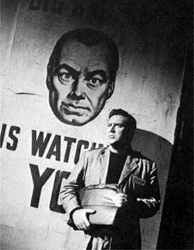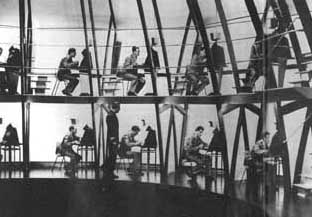G. Orwell
LIFE

India 1903
- Happy childhood in:
- Thames Valley
- Discontent of school days due to:
-
Physical discomfort
Loneliness Lack of privacy
Humiliating punishment
Pressure to uniform to GB school's values
He's an outcast
- Etan:
-
Here too he's an outcast
More freedom
Shaped a vigorous prose style- Developping:
-
An independent-minded personality
An indifference on accepted values
Such, such were the Joys
1922 Became I.I. Policeman
- Wrote 3 books:
-
Burning days
Shooting an elephant
A hanging
1927 Back from India
- Develops an anti-imperialistic idea
- Increasing hatred of class privileges and authority(pg.211;pl.A)
LONDON
- East-End Company of down and outs
-
- Experienced
-
Poverty
Hostels
Prisons
Lodging houses
Hospitals
1928 PARIS (18 Months) to write
- Book
- Down and out in Paris and London
18 months later in Great Britain:
- Assume the pseudonym of George Orwell
-
George: Englishness(plain speak, common sense)
Orwell: A river he loves
1932
- Became teacher
-
A clergyman's daughter
('35)
1934
- New work in a bookshop
-
Keep the Aspidistia Flying
('36)
1936
- Investigates about north miners conditions
-
writing
The road of W. P.
1938
- journalist at the Spanish war where he fight with the left-wing: compelled to go home
-
Homage to Catalonia
1941
took up a job: BBC (War reporter)1943
took up a job: literary editor of Tribune (socialist weekly)1944
Fame arrives with a satire of Russian totalitarianism:Animal Farm
1946-49
Writes:Nineteen Eighty-Four
THOUGHT
Life, work as a wholeIn his personality the man and the artist were inextricably linked, the experience of the individual supplying the material for the work of the artist.
- English writer:
-
Deep understanding of English characters:
- Dislike of abstract theories
- Tolerance
- Common sense
- Fair play
- Outside writer:
-
Unusual ability to see his country from the outside apprising:
- Strength
- Weakness
- The two above
-
Discuss about his country strength and weakness with a penetrating and original insight.
Critical studies of provincial English life(pg.123;pl.A) - Reject his background:
-
Create his independent personality:
- Receptive to new ideas and impressions
- Need to experience unknown life aspects.
- Unresolved conflict:
-
Much of his life seems to have been a reaction against the politics of the Empire and the limitations of middle-class life, as he experienced them in his own family. He hated the narrow-minded snobbishness of the teachers, the cult of sport and the bulling among the boys. (pg.123;pl.A)
Bourgeois background vs. working class identification with - Urge to:
-
Inform
Reveal facts
Draw conclusion
WritingInterpreted reality
andUseful social function
, he analyzes and comments on his time
He firmly believed that the moral integrity of the individual was the last hope of a society threatened by materialism and totalitarianism.(pg.341(ID_2);pl.B) - And more
-
Subjective feeling in his work
Most successful moral
Deals with particular themes - Forms, style
- Fiction Essays, novels (Dickens,..) Yet Orwell's not a novelist in the conventional sense. His aim is not to create convincing characters, nuances of behavior, entertaining plots. He writes novels essentially to deliver his reformist message, and this gives his fiction a special tension and satirical touch(pg.341(ID_4);pl.B)
- Themes
-
Freedom of though and individual liberty Turn political writing into art Concerned with problems of construction and of language Good prose is like a window-pane, so language must be clear and direct (pg.125;pl.A)
In his essays and novels Orwell constantly addressed the problem of relationship between the individual and the reality of the Thirties. He strove to find a literary medium through which he could record reality from unbiased point of view. He elaborated a type of reportage in which the writer had to describe things in a styleas clear as a window-pane
(pg.341;pl.B) - Writers rule:
-
Should be independent
No good writing could came from following party line
Responsibility to observe, record his age
Orwell's literary achievement is the expression of courageous intellectual freedom and honesty. In a decade in which it almost compulsory to conform to a specific belief, […], he chose none of them, convinced thatestablished faiths accelerated the process by which the autonomous individual is ceasing to exist
. (pg.341(ID);pl.B)
1984 Nineteen Eighty-Four (The last man in Europe)

- Introduction
-
- It's a novel about the society of the future
- The out standing achievement of this book is the highly original and informative account Orwell gives of the political mechanisms of totalitarianism: the methods by which thought id controlled, privacy invaded, and personal resistance broken down. One of the most interesting sections of the book is a long account of the way a totalitarian state attempt to control the thoughts of its citizens through language(pg.130;pl.A)
-
It's a novel about the society if the future, which original title should have been
The last man in Europe
(pg.129;pl.A) - Apparently 1984 seemed to the author a date fairly remote in time for a science fiction novel, and yet close enough to deal with situations which his contemporary audience could easily recognize(pg.147;pl.B)
- It's an apocalyptic view of the fate of the modern man. It's full of a sense of injustice, inhumanity and violence the result of the political system imposed by a dictatorship upon the individuals that inhabit an imaginary London in 1984(pg.195;pl.C)
- Origins:
-
The bleakness and harsh climate of the island (Jura), combined with Orwell's illness seem to have been mirrored in author's portrayal of human suffering (pg.195;pl.C)
Orwell imagines Britain forty years in the future as a totalitarian dictatorship, combining elements of both Communism and Fascism in an all-powerful, omniscient police-state, based on terror (pg.129;pl.A) - Tyranny characteristics:
-
 It's full of a sense of injustice, inhumanity and violence Give sensation of loss, a feeling that beauty and truth and all finer emotions and values belong to the past Oppression masked with paternalism
It's full of a sense of injustice, inhumanity and violence Give sensation of loss, a feeling that beauty and truth and all finer emotions and values belong to the past Oppression masked with paternalism
Unique party- Big Brother
-
He's never seen in the flesh but is constantly present in posters that dominate every public space(pg.33;pl.C)+(pg.129;pl.A)
Never seen
Always all under his control
Political aristocracy auto limits her self
Lords control the system being in it, without special conditions
Permanent state of war - Absolute control of:
-
Broadcast
Communications
Propaganda
Language › Newspeak
Thought › Thought crime
History › Control of history, rewriting of the history books and newspaper, changing events to fit the party line on them(pg.129;pl.A)
- Expressed in
-
War is peaceFreedom is slavery
Ignorance is strength
In the interest of the state party
- Education
- Children are encouraged to denounce their parents for deviations from strict orthodoxy (voluntaries or in voluntaries)
- Society
-
Society artificially constructed in according to the totalitarian principles of Ingsoc(pg.147;pl.B)
- Divided in 3 classes
-
- Inner party
- Formed by the main political figures of the regime, comparable to Russian nomenclatura
-
- Outer party
- Including whose work for the Inner party
-
- Proles
-
Making up 85% of the population, are the lowest members of the society.
Ignored by the Party, which does not see them as a threat, the proles are kept in a state of complete ignorance to be manipulated as Party wishes.(pg.33;pl.C)
- Individual has no space
-
Not allowed:
Sex for pleasure
Love
Procreation
Write diary, make trace of the past
Think different, be different
No written laws, nothing forbidden, nothing allowed
High-tech, telescreens cameras wherever
Darkness
Society subordinated to State - Expression:
-
Poor lexis to reduce expression possibility, ability:
Minutes of Hate
Newspeak: to mask concepts
Double-think: to destroy any other thought possibility - Suggests:
-
Attack against modern society
Warn to future
Orwell's dystopian novel expresses his fear that in a totalitarian regime life could become totally uniform, that primitive drives like love and physical pleasure could be repressed in a stiff, insensitive manner, and that human freedom could be hindered by an intrusive burocracy(pg.147;pl.B) -
Environment

-
London:Grotesque, squalid, nightmarish
Darkness - Winston Smith(protagonist)
-
Lose of man values Smith:commonest Great Britain name
Winston:2nd World War Churchill's political appeal
Alienated from society
Desires spiritual, moral integrity
He writes a diary - Technology:
-
Individual is crushed by totalitarianism and technological inventions
Technology is the frightful support to totalitarianism - Style:
-
In keeping with the squalor, misery and hopelessness of the
de-humanized humanity
, the style is characterized by something of a hyperrealism combined with a visionary quality, whereby detailed descriptions of sordid places and people alternate with a futuristic representation of an entirely mediatic world(pg.147;pl.B)
Fiction as a vehicle for his political view
English utopian satire tradition
- Combines various genres
-
Documentary realism
Parody
Satire Tone increasing violent
No consolation
Reveals Orwell acute sense of history
Sympathy with persecuted by a totalitarian government - Newspeak vocabulary:
-
- Newspeak
-
Official language imposed by the party
Simplified, impoverished version of English, where all concept words have been eliminated
It's impossible to commit the crime of subversive thought
This limits the danger of independent thought - Double-think
-
Involves holding two contradictory beliefs in the mind at the same time, and an ability to believe to both of them (2+2=5)
called also reality control - Ingsoc
- Is the only political doctrine admitted by the Party
- Thoughtcrime
-
Individual expression and critical thought
going against the principles of collectivism
Thoughtcrime does not entail death: thouhgtcrime IS death

 Previous
Previous